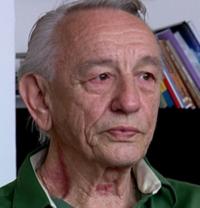People should keep their eyes open, they have to be careful
Ivan Hupka was born on February 19, 1939 in Svätý Jur. His mother was a housewife and his father was a clerk. He had three siblings. When he was thirteen, his family moved to Dunajská Streda. Ivan attended the grammar school there and after the school leaving examination he enrolled at the Slovak Technical University. He finished his university studies in 1959 in Prague and became a specialist in the field of automobiles and tractors. When he came back to Slovakia, he got workplace admittance in the automobile factory in Nitra. Because of a long distance and complications relating to travelling he asked for a new place. He could work in the Research Institute of Occupational Diseases in the department of air-conditioning, but finally he got employed in Trnava where he taught at the Secondary Technical School of Mechanical Engineering for four years. He liked his work a lot but after some time he started to long for some more creative job. Therefore he attended the job interview in the Czechoslovak Television (CST), in Bratislava broadcasting studio, where he applied for the position in the youth editorial board. He managed to get this job and became a co-author of the program for young people called “Through the Eyes of Youth”. At the same time his wife Mária worked in the CST as a secretary at the department of documentary films production. In 1966 Ivan moved to the editorial board of the department of journalism and documentary films production as well. The events of August 1968 caught them both there. During the occupation period Ivan cooperated with the Czechoslovak Television staff and engaged himself in the production of its media coverage. At the same time he participated in the production of a unique documentary film directed by Kazimír Barlík and titled “In the Name of Conscience”. In the period of so-called normalization this documentary film has never been broadcasted. It was a fateful incident for Ivan. Soviet leadership and incoming government in Slovakia boded ill. Ivan recognized forthcoming danger and thus he immigrated to Australia along with his wife and two little daughters. Slovak judiciary tried them in their absence. They were given custodial sentence, so in case of coming back home, they would be imprisoned. Only after more than twenty years of living abroad, he and his wife Mária could return to their homeland as free citizens.

